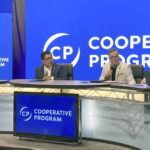
NEW ORLEANS, La. (BP) – The Diaspora Missions Collective, a collaboration between multiple different Southern Baptist Convention organizations, is a group focused on assisting churches to engage scattered or displaced ethnic groups both internationally and domestically.
John Barnett, director of diaspora mobilization for the International Mission Board, spoke about the collective’s mission during a Cooperative Program Stage panel on Monday, June 12.
“The collective came out of a passion that God’s been laying on people’s hearts,” Barnett said. “An awakening happening among Southern Baptists to say ‘how do we respond to what’s going on globally?’ Saying ‘how do we as the church respond? How can we get the Gospel to people? How do we welcome the nations as they’re coming here, and how do we go out and go to the nations and share the Gospel with them?’”
Barnett explained the word “diaspora” means scattered, and the Missions Collective focuses on ministering to those who have been forcibly displaced (refugees), immigrants and international college students.
He cited statistics which indicate more than 105 million people have been forcibly displaced around the world, more than 1 million international students come in and out of the country every year, and the immigrant population in the U.S. is somewhere between 15 and 20 percent.
The collective is a collaboration between SBC organizations like the International Mission Board, North American Mission Board, Send Relief, Woman’s Missionary Union, SBC seminaries, Baptist state conventions and local associations to equip churches to reach said groups.
“All of those that are serving the local church are saying if we can gather together, form a committee, share resources, we can have so much more of a global impact for the nations,” Barnett said.
“I think it just gives a beautiful picture of the Cooperative Program. Working together, how can we do the networking and equip our churches, so that they don’t just learn and gain the awareness, but go back to their community and actually replicate the work and to be able to reach the nations that are right there in their community.”
The panel discussion featured a variety of representatives from SBC organizations who are serving on the steering committee of the Missions Collective.
One of these, Josh Benton, is vice President of North American ministry for Send Relief. He said one of Send Relief’s focus areas is care for refugees, which has been one of its fastest growing ministries in the last year and a half due to situations in countries like Afghanistan and Ukraine.
“It’s really an extension of the Great Commission,” Benton said of ministering to refugees. “When we hear Jesus tell us to go, I think our mindset typically has been, we have to go somewhere else to reach people that maybe are different from what our community context is. That ‘somewhere else’ is getting a lot closer to home. Some of the people groups that are coming to the United States now, it’s really hard to get into those countries with missionaries, and now they’re right around the block.”
Keelan Cook is the George Liele director for the Center for Great Commission studies at Southeastern Baptist Theological Seminary. He also serves as instructor of missiology and the coordinator of diaspora missions and evangelism for the seminary.
“There’s this understanding I think is starting to develop that this is for North American missions, not just international missions nowadays, one of the most critical issues that we have to be able to prepare and equip people for,” Cook said.
“Developing those cross-cultural competencies is something that’s permeating everything that we do at this point. It has to for us to prepare for the future that’s in front of us.”
Jamie Naramoere is the cross-cultural strategist for the Arkansas Baptist State Convention’s church-planting team and Send Network Arkansas.
Naramoere said the increase in scattered people groups in the country is an opportunity for Southern Baptists to fellowship with and reach various ethnic groups.
“I serve churches within a smaller state … this impacts us just as much as it does larger cities all around the country and larger states,” he said.
“Whether you’re from a small town or a big city, this is touching you. You have brothers and sisters from around the world that are calling themselves Southern Baptist right alongside you. We’re cooperating together.
“We have to fellowship cross-culturally, but we also have to reach cross-culturally. Not only have the nations come to us, but the unreached nations have come to us. We as churches have to think and act cross-culturally if we’re going to engage the people that God’s allowed us the privilege to work with.”
The full panel discussion can be found on the Cooperative Program YouTube channel.























